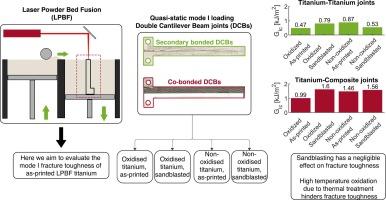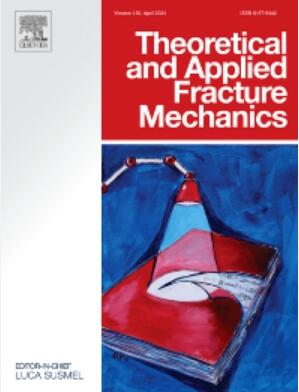Effect of the surface morphology of 3D printed titanium substrates on the mode I fracture toughness of metal-metal and metal-composite bonded joints
IF 5
2区 工程技术
Q1 ENGINEERING, MECHANICAL
引用次数: 0
Abstract
Parts manufactured with Laser Powder Bed Fusion (LPBF) are drawing interest in the adhesive joints research because of their high surface roughness, which is usually associated with good adhesion. This work aims to assess the adhesion strength of the inherent surface morphology of LPBF manufactured titanium.
Double Cantilever Beam (DCB) tests were carried out to determine the mode I fracture toughness of joints comprising as-printed titanium (Ti6Al4V) adherends, namely titanium-titanium secondary bonded and titanium-Carbon Fibre Reinforced Polymer (CFRP) co-bonded joints. The effect of high-temperature oxidation on the fracture toughness was also evaluated by testing a batch of joints in which the titanium underwent a post-printing thermal treatment. The as-printed specimens were compared to the same type of joints but with sandblasted titanium adherends to evaluate the effect of this surface pre-treatment on the value of fracture toughness.
The results indicate that non-oxidised titanium joints with untreated adherends had an average of 11% higher fracture toughness than their sandblasted counterparts. On the other hand, sandblasting proved beneficial for oxidised joints, increasing the fracture toughness by 64% on average over the untreated samples.

求助全文
约1分钟内获得全文
求助全文
来源期刊

Theoretical and Applied Fracture Mechanics
工程技术-工程:机械
CiteScore
8.40
自引率
18.90%
发文量
435
审稿时长
37 days
期刊介绍:
Theoretical and Applied Fracture Mechanics'' aims & scopes have been re-designed to cover both the theoretical, applied, and numerical aspects associated with those cracking related phenomena taking place, at a micro-, meso-, and macroscopic level, in materials/components/structures of any kind.
The journal aims to cover the cracking/mechanical behaviour of materials/components/structures in those situations involving both time-independent and time-dependent system of external forces/moments (such as, for instance, quasi-static, impulsive, impact, blasting, creep, contact, and fatigue loading). Since, under the above circumstances, the mechanical behaviour of cracked materials/components/structures is also affected by the environmental conditions, the journal would consider also those theoretical/experimental research works investigating the effect of external variables such as, for instance, the effect of corrosive environments as well as of high/low-temperature.
 求助内容:
求助内容: 应助结果提醒方式:
应助结果提醒方式:


